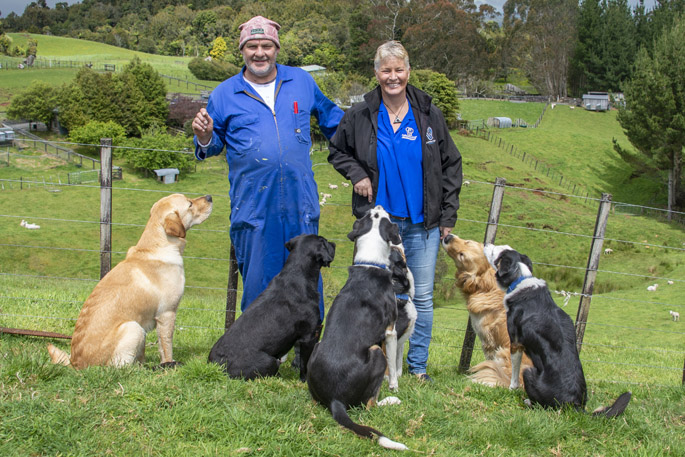It was a job re-location that triggered the move from Auckland to the Waikato for couple Julie and Rick Hancox. Julie, a guide dog trainer and instructor, was offered a role in the Waikato and they jumped at the opportunity to leave city life behind.
In 2006 they bought a 10.25 hectare bare block of rolling hill country in Ngutunui. Set on the southern slopes of Mount Pirongia, with panoramic views of hills and bush, the property is still within easy reach of civilisation. “We both love being a bit remote,” says Julie.
Embracing country life
Rick, an ex-project manager for an Auckland building company, and carpenter by trade, immediately set to work managing the build of an American-style barn on the property.
Once the shell and concrete pad was up, he took over and finished the building himself. A section of the barn was made into a flat for the couple, with the view to building a house one day “soon”.
“That was 12 years ago and earlier this year we have finally started our new house and Rick is working on it daily.”
While Julie has some dairy farm experience, Rick was new to the ‘farmlet’ life. He’s taken responsibility for maintaining the land and looking after the animals. They have always run Wiltshire sheep, with numbers swelling to around 200 after lambing.
“We now have a flock of fully-shedding Wiltshires,” says Julie. “Which lifestyle farmers find easy as they don’t require any shearing and are easy care, but also a great meat sheep.”
Julie has three heading dogs, ‘Widget’, ‘Bluff’ and ‘Gaze’, for helping on their block and for her “part-time hobby” going to sheepdog trials.
Assistance dogs
In 2008, Assistance Dogs New Zealand was founded as a charitable trust and the Hancox property became the base of operations for the breeding, raising and training of assistance dogs for individuals and families living with a disability.
ADNZ breeds and trains dogs to help people, mainly children, with disabilities such as autism, Down syndrome, chromosome disorders, global developmental delay, foetal alcohol syndrome, cerebral palsy, charge syndrome and multiple sclerosis.
“Realising there was a huge need for this kind of help, we wanted to create an organisation that would provide them with the opportunity to obtain an assistance dog through a NZ provider that would be able to certify public access rights so the dogs could legally be used in all environments,” says Julie.
After her years training guide dogs, Julie knew they would have the greatest success with dogs specially bred for this purpose. With the help of a kind donation, the first two dogs were imported from Guide Dogs Queensland and became ADNZ founding breeding stock.
Currently, ADNZ has two active brood bitches and one active stud dog for their programme, with replacement stock growing up on the puppy programme.
Frozen semen for artificial insemination is also used to keep up genetic diversity, and as a cheaper alternative to keeping live stud dogs on the programme. Currently, only labrador retrievers and golden retrievers are used in the programme.
Funding
Raising and training these dogs takes $20,000 and around two years to complete, and approximately a further $5000 a year, per dog, for organisation running costs.
“While we have young dogs in different stages of training and development with ADNZ, we can only breed as many puppies each year as we are able to train place and support.”
ADNZ currently has volunteer puppy raisers who take the pups from eight weeks to 14-18 months.
“At this time we only have one full-time trainer and while we do need more trainers they need to pass through a two-year training programme, followed by a third year should they wish to become an instructor,” says Julie.
“Similar to an apprenticeship training programme, we need funds to pay them as they learn and work, which is just not possible currently.”
ADNZ is a registered, not-for-profit charity, and is internationally accredited and recognised around the world. The NZ Government has legally recognised the organisation to provide certification to their dogs for legal public access.
“At this stage we receive no government funding, so we are financially unable to meet the high demand for the dogs,” says Julie.
“Funding comes from puppy sponsorship, annual appeal, private donations and sometimes bequests.
“Basically, we need a big corporate sponsor to give us a bucket-load of money and tell us to get on with moving ADNZ to the next level – training up staff to ensure sustainability and to increase supply of these dogs in the community.”
In the meantime, ADNZ does as much as it can with the resources and money it has. The reward being the major difference that an assistance dog can bring to the lives of a disabled person and their family.
For more information, see: www.assistancedogstrust.org.nz



0 Comments
Leave a Comment